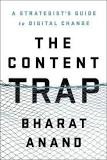 Dr. Bharat Anand, Henry R. Byers professor of business administration at Harvard Business School and author of The Content Trap, states in his afterword, “I knew that many things around us would change by the time I had finished it [and they did].” He recognizes, in an era of massive digital content generation, that content has not changed as much as the art of managing it, thanks to technology and the way in which connections are created. He sets the stage by explaining how content is valued and consumed by billions of people daily. As a result, businesses try to produce the best and most relevant content. The proliferation of content — five exabytes (five billion billion bytes) are generated every two days — creates “the problem of getting noticed.” The extremely low cost of digital content distribution, in turn, creates “the problem of getting paid.” The combination of the two problems is deadly.
Dr. Bharat Anand, Henry R. Byers professor of business administration at Harvard Business School and author of The Content Trap, states in his afterword, “I knew that many things around us would change by the time I had finished it [and they did].” He recognizes, in an era of massive digital content generation, that content has not changed as much as the art of managing it, thanks to technology and the way in which connections are created. He sets the stage by explaining how content is valued and consumed by billions of people daily. As a result, businesses try to produce the best and most relevant content. The proliferation of content — five exabytes (five billion billion bytes) are generated every two days — creates “the problem of getting noticed.” The extremely low cost of digital content distribution, in turn, creates “the problem of getting paid.” The combination of the two problems is deadly.
Businesses fall into the Content Trap mindset by: first, obsessing with isolated triggers rather than recognizing the conditions that make them spread; second, preserving content at all costs rather than seizing the opportunities around it; and, lastly, searching for the right approach to confronting digital fires rather than understanding that the right way requires understanding the context in which the fires burn. These three expressions or errors cause businesses to miss the connections that shape the digital components of any business. Anand posits that being able to recognize, leverage, and manage connections separates companies that succeed versus those that fail. The Connections Triad of user connections, product connections, and functional connections can lead companies out of the Content Trap.
The Content Trap is organized into four parts; the first three discuss user, product and functional connections, while the last is entitled, “Everyone’s a Media Company.” I like this book so much, I’ve recommended that all of my senior leadership team read it and, for the first time ever, I’m publishing a five-part book review to assess it, including this introduction. I highly recommend it to anyone in a leadership role at a company trying to grow its digital components. Bharat Anand has done an excellent job at highlighting the way to grow a company digitally, as well as describing the interaction between the major connections.
*Author’s note: Unless otherwise noted, the factual observations and images included herein are the intellectual property of Dr. Bharat Anand and/or Random House Publishing Group.











